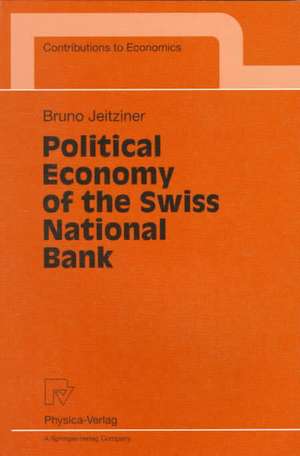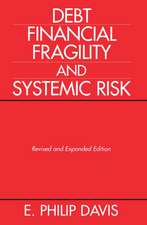Political Economy of the Swiss National Bank: Contributions to Economics
Autor Bruno Jeitzineren Limba Engleză Paperback – 21 iun 1999
Din seria Contributions to Economics
- 18%
 Preț: 1001.81 lei
Preț: 1001.81 lei -
 Preț: 90.83 lei
Preț: 90.83 lei - 15%
 Preț: 649.06 lei
Preț: 649.06 lei - 18%
 Preț: 1109.92 lei
Preț: 1109.92 lei - 24%
 Preț: 657.09 lei
Preț: 657.09 lei - 18%
 Preț: 976.54 lei
Preț: 976.54 lei - 17%
 Preț: 361.03 lei
Preț: 361.03 lei - 18%
 Preț: 1027.83 lei
Preț: 1027.83 lei -
 Preț: 283.93 lei
Preț: 283.93 lei - 15%
 Preț: 644.95 lei
Preț: 644.95 lei - 15%
 Preț: 638.24 lei
Preț: 638.24 lei -
 Preț: 394.29 lei
Preț: 394.29 lei - 15%
 Preț: 636.80 lei
Preț: 636.80 lei - 15%
 Preț: 637.78 lei
Preț: 637.78 lei - 18%
 Preț: 723.69 lei
Preț: 723.69 lei - 15%
 Preț: 635.47 lei
Preț: 635.47 lei - 15%
 Preț: 634.00 lei
Preț: 634.00 lei -
 Preț: 392.75 lei
Preț: 392.75 lei -
 Preț: 383.33 lei
Preț: 383.33 lei - 15%
 Preț: 637.28 lei
Preț: 637.28 lei - 15%
 Preț: 636.80 lei
Preț: 636.80 lei - 18%
 Preț: 950.96 lei
Preț: 950.96 lei - 15%
 Preț: 634.68 lei
Preț: 634.68 lei -
 Preț: 387.38 lei
Preț: 387.38 lei - 15%
 Preț: 647.27 lei
Preț: 647.27 lei - 15%
 Preț: 636.63 lei
Preț: 636.63 lei - 15%
 Preț: 639.73 lei
Preț: 639.73 lei -
 Preț: 385.62 lei
Preț: 385.62 lei - 15%
 Preț: 641.85 lei
Preț: 641.85 lei - 20%
 Preț: 649.60 lei
Preț: 649.60 lei - 15%
 Preț: 641.71 lei
Preț: 641.71 lei -
 Preț: 387.96 lei
Preț: 387.96 lei - 15%
 Preț: 645.47 lei
Preț: 645.47 lei -
 Preț: 385.08 lei
Preț: 385.08 lei - 15%
 Preț: 646.62 lei
Preț: 646.62 lei -
 Preț: 383.33 lei
Preț: 383.33 lei - 15%
 Preț: 638.43 lei
Preț: 638.43 lei -
 Preț: 381.21 lei
Preț: 381.21 lei - 15%
 Preț: 642.51 lei
Preț: 642.51 lei - 15%
 Preț: 637.78 lei
Preț: 637.78 lei - 15%
 Preț: 641.71 lei
Preț: 641.71 lei -
 Preț: 384.70 lei
Preț: 384.70 lei -
 Preț: 379.86 lei
Preț: 379.86 lei -
 Preț: 378.34 lei
Preț: 378.34 lei -
 Preț: 384.70 lei
Preț: 384.70 lei -
 Preț: 388.52 lei
Preț: 388.52 lei - 15%
 Preț: 641.71 lei
Preț: 641.71 lei -
 Preț: 381.00 lei
Preț: 381.00 lei - 15%
 Preț: 644.95 lei
Preț: 644.95 lei -
 Preț: 386.00 lei
Preț: 386.00 lei
Preț: 640.06 lei
Preț vechi: 753.01 lei
-15% Nou
Puncte Express: 960
Preț estimativ în valută:
122.48€ • 130.97$ • 102.12£
122.48€ • 130.97$ • 102.12£
Carte tipărită la comandă
Livrare economică 18 aprilie-02 mai
Preluare comenzi: 021 569.72.76
Specificații
ISBN-13: 9783790812091
ISBN-10: 3790812099
Pagini: 288
Ilustrații: XIV, 270 p.
Dimensiuni: 155 x 235 x 15 mm
Greutate: 0.41 kg
Ediția:Softcover reprint of the original 1st ed. 1999
Editura: Physica-Verlag HD
Colecția Physica
Seria Contributions to Economics
Locul publicării:Heidelberg, Germany
ISBN-10: 3790812099
Pagini: 288
Ilustrații: XIV, 270 p.
Dimensiuni: 155 x 235 x 15 mm
Greutate: 0.41 kg
Ediția:Softcover reprint of the original 1st ed. 1999
Editura: Physica-Verlag HD
Colecția Physica
Seria Contributions to Economics
Locul publicării:Heidelberg, Germany
Public țintă
ResearchCuprins
1 A Reaction Function Study for the Swiss National Bank.- 1.1 Introduction.- 1.2 The Concept of Reaction Functions.- 1.3 Reaction Functions for the SNB.- 1.4 The Data.- 1.5 Results: How the SNB Behaved.- 1.6 Conclusions.- 2 Deficits and Money Growth: Empirical Evidence for Switzerland.- 2.1 Introduction.- 2.2 Budget Deficits and Money Growth.- 2.3 Previous Studies on the Impact of Fiscal Policy Variables on Swiss Monetary Policy.- 2.4 The Money Growth Equations.- 2.5 The Fiscal Data.- 2.6 Estimation Results.- 2.7 Conclusions.- 3 Elections and Monetary Policy: Is There a Political Monetary Cycle for Switzerland?.- 3.1 Introduction.- 3.2 Models of Politico-Economic Cycles: An Overview.- 3.3 Application to Switzerland: Why Should There Exist a Political Monetary Cycle?.- 3.4 Comparing Economic Conditions for Election and Nonelection Years.- 3.5 Testing for Political Monetary Cycles.- 3.6 Conclusions.- 4 The Executive Central Bank Relationship: The Case of Switzerland.- 4.1 Introduction.- 4.2 The Legal Relationship between Executive and Central Bank.- 4.3 Inflationary Performance as a Result of the Structure of the Executive.- 4.4 Inflationary Performance as a Result of Characteristics of the Swiss Political Market for Monetary Policy.- 4.5 De Facto (In)Dependence of the SNB: An Empirical Test.- 4.6 Conclusions.- 5 Legislative Influence on Monetary Policy? The Case of Switzerland.- 5.1 Introduction.- 5.2 The Theory of Legislative Influence (or the ‘New’ Theory of Bureaucracy).- 5.3 Application of the ‘New’ Theory of Bureaucracy to Central Banks: Legislative Influence on the Federal Reserve.- 5.4 Legislative Influence on SNB Behavior?.- 5.5 Conclusions.- List of Abbreviations.- List of Tables and Figures.- References.














